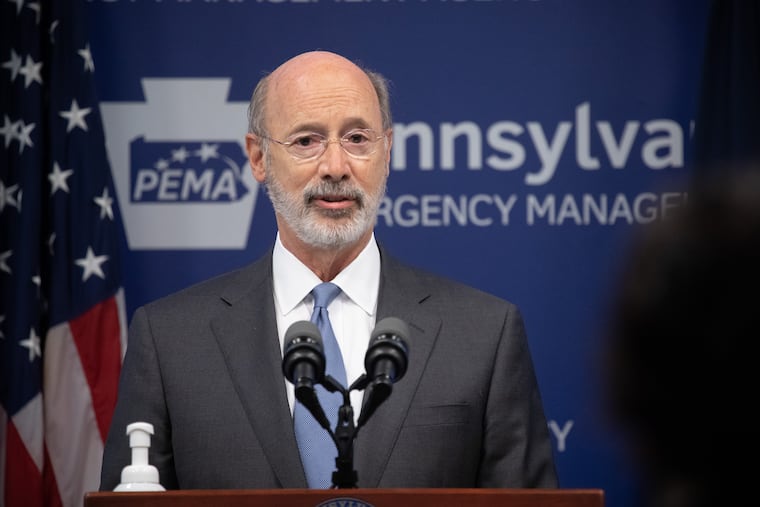Pa. drop in COVID-19 cases wins federal praise, and New Jersey works to reopen colleges
The continued declines were announced as states and cities slowly reopened businesses, restaurants, and other amenities.

New cases of the coronavirus in Pennsylvania are continuing to decline, Secretary of Health Rachel Levine announced at a daily news briefing on Wednesday, and federal officials have singled out the state as one of just three — along with Montana and Hawaii — where cases have declined for more than 42 days.
And in New Jersey, the seven-day average of new cases has dropped low enough that the state, which was once a national hot spot of the virus, now has a new-case average slightly lower than Pennsylvania’s.
In Philadelphia, the rate of new cases has stayed steady at about seven per 100,000 residents each day for the past week. City officials say it’s a good sign that the rate is holding even though more people in the city are getting tested for the virus. And on Wednesday, less than 3% of the 2,000 test results received by the city were positive, said city health department spokesperson James Garrow.
“You’re always shooting to get below 10%,” Garrow said. “This is the lowest we’ve seen since the very beginning of the pandemic. So the number of tests has gone up while the percent positive has gone down, which is great news.”
» READ MORE: Joe Biden says Trump is ‘surrendering’ to coronavirus in latest visit to Pa.
Cases have dropped in the counties surrounding Philadelphia as well, with Bucks County reporting an average of just 21 new cases a day over the last seven days as of Tuesday. Montgomery County, where the region’s first cases were reported three months ago, and which was reporting the highest new-case averages of the suburban counties at the height of the pandemic, was down to a seven-day average of 40 new cases. Delaware and Chester Counties had a seven-day average of new reported cases of 29 and 30, respectively.
The continued declines were announced as states and cities slowly reopened businesses, restaurants, and other amenities. On Wednesday, New Jersey Secretary of Higher Education Zakiya Smith Ellis laid out a set of guidelines for colleges, universities, and trade schools that will be allowed to reopen — though under considerable restrictions — as early as next month under Stage 2 of the state’s reopening plan.
Colleges must submit a “restart plan” to the state 14 days before they open their doors, state officials said, and at least for now, the only in-person classes allowed will be clinical and lab rotations.
Career and training schools can open as long as they conform to health and safety protocols “from their respective oversight agencies,” state officials said.
“Colleges this fall and summer will not look the same as they did last year,” Smith Ellis said. Social distancing, hand washing, and cleaning protocols will be in place, and students will be required to wear masks indoors.
“It’s hard to have a maximum number” of occupants in a university classroom,” Smith Ellis said. “If you’re in a small classroom, you’re literally going to need to go in with a tape measure and figure out how many people can be in that space. Practically, most institutions are going to be continuing with some hybrid version of in-person and online.”
The state is strongly recommending that students also wear face masks outside, and that students or faculty at higher risk of serious complications must be allowed to teach or attend class remotely.
“A limited number of students can return to residential facilities,” Smith Ellis said, but common areas will need to stay closed, and housing should be prioritized for students who need it the most.
Officials in Pennsylvania and New Jersey on Wednesday briefly responded to questions about lawsuits surrounding the states’ coronavirus responses. In Pennsylvania, the state Supreme Court announced that it would rule in a lawsuit launched by Republicans in the legislature and aimed at ending Gov. Tom Wolf’s emergency disaster declaration. The Associated Press reported that Wolf had requested that the majority-Democratic court handle the case, and at Wednesday’s news conference, he said he “applauded” the decision.
In New Jersey, Gov. Phil Murphy for a second day declined to answer in depth questions about a lawsuit over the firing of Christopher Neuwirth, a former higher-up in the state health department, who alleged he was fired in late May because he did not arrange a COVID-19 test for family members of another of Murphy’s aides, NJ.com reported. State officials have said he was fired for holding a second consulting job. A representative for Murphy told NJ.com the claim was “meritless,” and Murphy on Wednesday praised the leaders of his COVID-19 response team.
Angela Couloumbis of Spotlight PA contributed to this article.